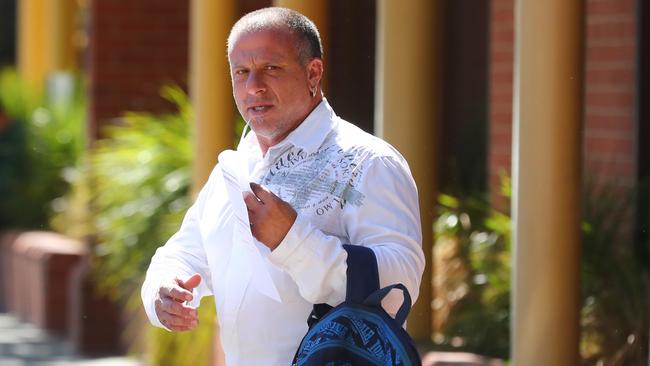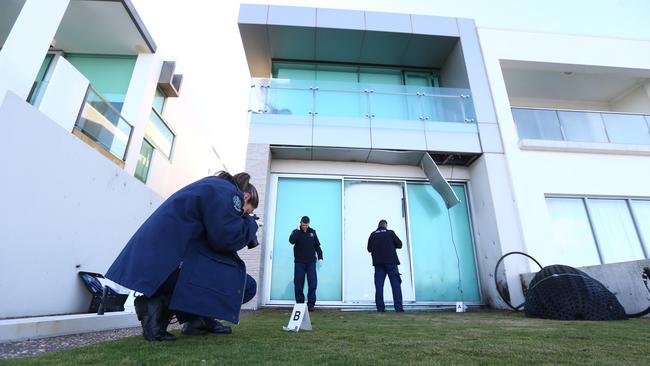Prosecutors and lenders wage war over right to Luigi Vitale’s property profile
Lawyers, lenders, cops and crims are closely watching a fight over a notorious bikie figure’s property, in a case that could have big consequences in the seizing of criminal profits.

Opinion
Don't miss out on the headlines from Opinion. Followed categories will be added to My News.
- Police launch investigation into Liberal MP Sam Duluk
- Subscriber rewards: Win Adelaide Oval Stadium Club memberships
A legal fight for the proceeds of the multimillion-dollar property portfolio of notorious bikie figure Luigi Vitale is being played out in the District Court.
Restraining orders have been placed on the accused drug trafficker’s three properties by the Crown, preventing Vitale from disposing of them – but a finance company is seeking to recover its considerable interest in two of them.
Sydney-based finance company CEG Direct Securities Pty Ltd is seeking to register its mortgages over the properties, but the Office of the Director of Public Prosecutions has appealed a court order allowing it to do so – and sell the properties to recover its financial exposure.
The District Court appeal action is being closely watched by prosecutors, senior police and defence barristers because its outcome could have a significant impact on the future use of the Criminal Assets Confiscation Act.
The DPP commenced confiscations proceedings against Vitale, 55, following his arrest in May 2018. He is facing one count of trafficking in a large quantity of a controlled drug and will face trial in the District Court in October.

The charge follows a Crime Gangs Task Force operation in 2018, during which his luxury Henley Beach South apartment was under surveillance. Detectives followed another man from the property and allegedly found 15 litres of the party drug fantasy when his car was searched. When detectives raided Vitale’s home – which in 2016 was damaged in a bombing attack by a rival bikie gang – Vitale was allegedly seen pouring liquid down a drain with a tap running.
The DPP obtained a restraining order on Vitale’s three properties – at Henley Beach South, Glenelg North and Normanville – a fortnight after his arrest. The order was obtained subject to the rights of another mortgagee, AFSH Nominee Pty Ltd, that had registered mortgages over the first two properties.
CEG was not notified of the summons seeking the restraining orders, as required under the Act, and only learned it had been granted when it attempted to register its two mortgages in June 2018. Court documents reveal Vitale owed CEG $869,300 at that time, but this has now ballooned to $1,061,648 with interest.
The amount owed to AFSH at the time was $1,064,961 but has now ballooned to $1,197,683.
The Henley Beach South property has been valued at $1.5 million and Glenelg North at $600,000. That is about $160,000 less than Vitale – who in 2002 was one of eight Rebels bikies and associates questioned but never charged over the drugging death of Dianne Brimble on a cruise ship – owes the two finance companies. In May last year, CEG sought and was granted an order by Master Peter Norman in the District Court to vary the restraining order to exclude from its terms its unregistered mortgages and sought liberty to register and enforce them over the properties.
The DPP appealed the order and obtained a stay to prevent the sale of the properties before Vitale’s trial was finalised.
The District Court appeal, before Judge Graham Dart, heard detailed argument from the DPP and CEG’s counsel over the operations and interpretation of the CAC Act, property and commercial law.
In argument, Judge Dart said his view was that the restraining order was only applicable to Vitale’s “interests’’ in the property.
He told CEG’s barrister, Alex Lazarevich, property was defined as an “interest and interest in equity’’ and “your property’s not specified in the order so it’s not covered by the order”.
“And that is consistent with common sense because this legislation is not supposed to get mortgagees in a headlock and cause commercial chaos,’’ Judge Dart said.
“It is supposed to restrain the accused from dealing with property so that if he is convicted, at the end of the day, his interest in the property is forfeited to the Crown.
“And the term of the order achieves that. It puts the Crown in the same position as the registered proprietor and if there is a forfeiture order made, the Crown gets Mr Vitale’s interest in the property.’’
Judge Dart said assuming there was a proper mortgage “the public interest is all your way”.’
“Commerce would be completely crushed if a mortgagee loses their mortgage,’’ he said.
He said “the public interest on the other side of it seems to be the Crown will get more money if they knock off your mortgage”.
Judge Dart said he had thought about sending the case to the Full Court because it was “obviously for everybody’s sake, the DPP and secured lenders, it would be commercially sensible for everybody in the state to have a definitive answer on what the Act means”.
Somewhat wryly, at the start of the appeal hearing Judge Dart asked Ben Garnaut, for the DPP, if Vitale had been convicted as yet on the trafficking charge, to which he replied he had not.
“So this could be a storm in a teacup because if he is acquitted the whole thing collapses?’’ Judge Dart said. “That’s correct,’’ Mr Garnaut replied.
Judge Dart’s judgment on the appeal will be handed down at a later date.
